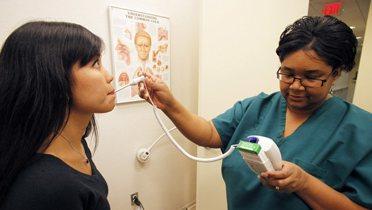Republicans do not have the votes to repeal the Affordable Care Act in the next Congress. A bill revising the health-care law looks more likely, presuming Senate Republicans can forge a united front and then pick up some doubting Democrats to get the votes necessary to overcome a presidential veto. The prospect of such an outcome could force the president to work out a bipartisan reform package in an effort to head off a showdown that many in his party may not want.
A number of changes to the ACA have been suggested, including increasing the threshold of weekly hours that defines full-time employees (which in turn triggers the employer mandate), repealing the tax on medical devices, and repealing the individual purchase mandate.
If the ACA revision train leaves the station, an effort should be made to preserve a feature of the law that is key to helping reverse, or at least stabilizing, the decline in the entrepreneurship rate that I and my colleague Ian Hathaway have highlighted in a number of studies for the Brookings Institution and in several posts for this blog.
That feature, known as “guaranteed issue,” requires health insurers to take all applicants while prohibiting insurers from taking into account preexisting health conditions when setting rates. This provision is critical for everyone who has a prior health condition (and at some age, who doesn’t?), especially individuals who have coverage through their employers but who want to start their own business or join a start-up that does not provide insurance (and is too small to be required to do so under the ACA). If potential entrepreneurs have had any sort of serious health problem, the risks of going without insurance may deter them from making that entrepreneurial leap.
A recent study of the Massachusetts health-care law, which is similar to the ACA, supports the importance of guaranteed issue. The study, by economists at the Federal Reserve Bank of Kansas City, found that the self-employment share of total employment–which is one measure of entrepreneurship–remained flat in Massachusetts after that state’s health-care law went into effect, while the self-employment rate in other Northeastern states and in the U.S. as a whole continued to drop. This study suggests that retaining guaranteed issue would be critical if policymakers want to prevent further erosion in the national start-up rate or, ideally, hope to turn around that decline.
Now, there is a catch with guaranteed issue. If insurers have to take all comers and not differentiate rates by people’s health status, unless they have large enough risk pools they are at the mercy of “adverse selection,” or new customers having higher health costs than average. The individual mandate in the ACA addresses this problem. Without the mandate, insurers would need to raise the average rates for everyone in their pools to cover the higher claims of those with preexisting conditions. This could encourage some customers to drop their insurance, or incur political pressure to constrain the rate increases, or both. In any of these scenarios, the health insurance business could easily unravel over time.
In principle, Congress could prevent this from happening by providing federal subsidies to insurers beyond those already in the law. But those who favor repeal of the individual mandate may not be willing to do that. If they aren’t, someone will need to find a way to make the guaranteed-issue requirement work without unraveling insurance risk pools. Otherwise, reforming the ACA could aggravate the nation’s secular decline in entrepreneurship, an outcome that neither political party would want.








Commentary
Op-edProtecting Entrepreneurs Amid a Push for Health-Care Reforms
December 11, 2014